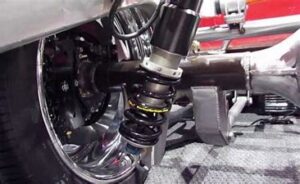Similar to how a human body depends on essential information, so does your car. The MAP sensor is a crucial operational indicator in your car. Its function is to communicate the amount of air in the engine to the computer in your car. Its name is Manifold Absolute Pressure. Consider it your car’s lungs, guaranteeing the proper ratio of fuel and air for efficient operation.
What happens if you unplug a MAP sensor, though? Well, it’s similar to holding your breath while swimming. The inability of your car’s computer to determine how much air is entering causes issues. Your car can start guzzling too much petrol and become thirsty for it. It can start acting lethargic as if it’s worn out from a hard day’s work. Even your dashboard may display warning lights to let you know anything is amiss.

In this article, we’ll examine the effects of unplugging this crucial sensor and what you should do in the event that it happens to you.
Table of Contents
What Is A MAP Sensor In A Car?
The MAP sensor is a crucial component of your car, which you may think of as a large jigsaw. Keep it straightforward; MAP stands for Manifold Absolute Pressure. Inside your car’s engine is a small detective called a MAP sensor. Its task is to calculate the amount of air entering the engine. To run efficiently, your car needs the ideal proportion of air and gasoline. It won’t taste right if you use too much sugar or too little flour while baking a cake. The same is true if your car receives too much or too little air; it won’t operate properly.
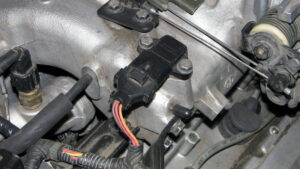
As a result, the MAP sensor informs the computer in your car how much air is there, and the computer uses this information to make adjustments and ensure that your car drives correctly. It’s like your car’s engine has a chef’s assistant making sure everything goes smoothly.
How Does A MAP Sensor In A Car Work?
Think of the engine in your car as a huge, ravenous beast. Similar to how you must breathe, it too must. The MAP sensor, or Manifold Absolute Pressure sensor, aids in optimum engine breathing. Therefore, here’s how it functions:
1. Measuring Air Pressure:
The intake manifold of your engine, sometimes known as the engine’s lungs, is where the MAP sensor is located. It is a little instrument that continuously gauges the volume of air present.
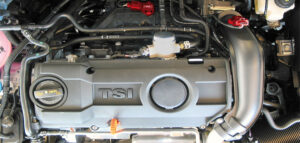
2. Transmitting Signals:
The MAP sensor transmits signals to your car’s computer, which is its brain, as you drive. When you press on the gas pedal or ease off, it signals the computer whether there is a lot of air or not.
3. Fuel Adjustment:
The computer determines how much fuel to add to the air for the engine to burn based on these signals. It’s similar to feeding the ravenous monster just enough food to keep it fueled.
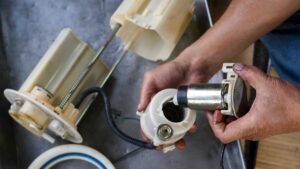
Hence, the MAP sensor facilitates proper engine breathing, allowing your automobile to function effectively, save fuel, and travel farther. It is a minor but crucial component of your car’s internal workings.
Reasons For Unplugging The MAP Sensor
You may be asking why someone would want to unplug such a crucial sensor at this point. There are a few reasons, though:
1. Diagnosis:
Sometimes mechanics will briefly disconnect the MAP sensor in order to investigate a problem. This can assist in figuring out whether the sensor is malfunctioning on its own or whether the engine is experiencing other problems.

2. Performance Optimization:
The MAP sensor may be unplugged by enthusiasts and performance tuners to get around some engine regulations. Although it might temporarily increase power, this is not a good idea for regular driving.
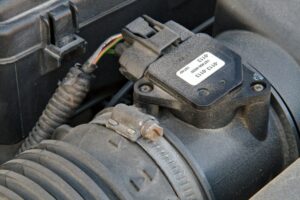
What Happens If You Unplug A MAP Sensor?
Things can go a little crazy when you unplug your car’s MAP sensor. Manifold Absolute Pressure, or MAP, sensors are crucial to the proper operation of your vehicle. It monitors the amount of air entering the engine, which is essential for the engine to operate perfectly.
What happens then if you remove that tiny sensor? So, your car becomes a little perplexed. It is no longer certain of the precise amount of air entering. Several issues could result from this:

1. Worse Gas Mileage:
Without the MAP sensor, your automobile may begin to consume more fuel than it should since it is not using fuel effectively.
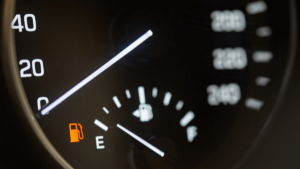
2. Poor Performance:
Your car won’t be as lively as it once was, you’ll notice. There won’t be a smooth acceleration, and you can lose some power.
3. Unclean Emissions:
If the air-fuel ratio is off, your car may start emitting more pollution. This harms the environment and could cause your vehicle to fail an emissions test.

4. Warning Lights:
With warning lights like the check engine light, the dashboard may appear to be lit up like a Christmas tree.
A car may become less effective, less powerful, and more polluting if the MAP sensor is unplugged. Except when a mechanic is diagnosing an issue, it’s usually not a smart idea. It’s advisable to get things checked out to keep your car operating smoothly if you do disconnect it and notice warning lights.
Solutions To Fix It:
Once the problem has been found, you must plug the MAP sensor back in if you disconnected it for diagnostic purposes. It’s usually advised to visit a skilled tuner who can maximize your car’s performance without endangering its health if you do it for performance reasons.
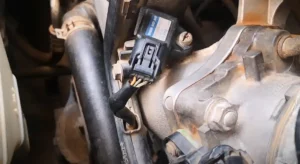
In either scenario, you should think about having your car’s issue codes examined if you notice warning lights on the dashboard. These codes can identify the precise problem and direct you or your mechanic to carry out the required fixes.
Conclusion:
Now, that you know what happens if you unplug a map sensor of your car, your car’s performance may suffer, emissions may rise, and warning lights may come on if the MAP sensor is unplugged. While occasionally necessary for diagnosis, it is not suggested for everyday driving. It’s best to consult a skilled mechanic who can correctly analyze and fix the issue if you detect an issue with your MAP sensor or any other area of your vehicle’s performance. Remember that maintaining your car’s sensors will guarantee that it operates smoothly and effectively, which is good for the environment and your budget.
![You are currently viewing What Happens If You Unplug A MAP Sensor? [Explained]](https://hydraulicsuspension.com/wp-content/uploads/2023/08/MAP.jpg)

